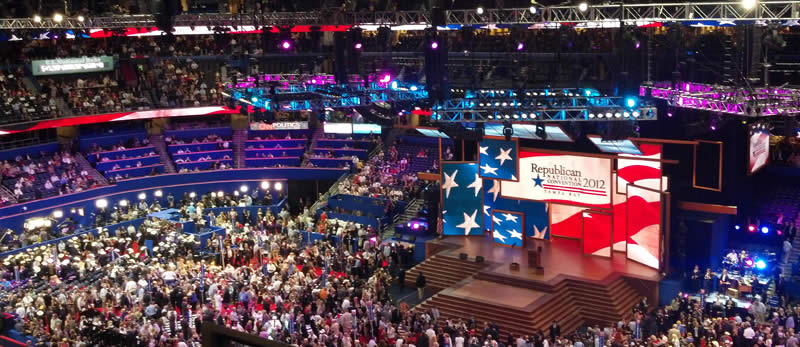by Y-Press
| Meet the reporters | Audio slideshow: Young Protesters at the RNC |
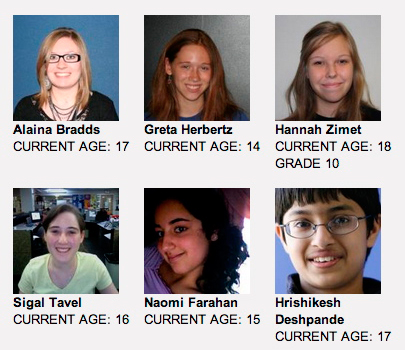 |
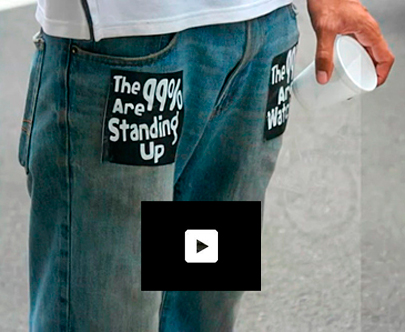 |
Radio interview: Young Latinos on the Rise
|
Reporters' notebooks (10)
Town Hall Conversations with the Next Generation
by Hrishi Deshpande, 17
According to a Y-Press survey of 400 youth earlier this year, education reform is one of the top issues facing this country.
It’s no surprise then, that education was one of the most-talked about topics at “Conversations with the Next Generation,” a town hall meeting in Tampa hosted by The Atlantic, National Journal, and Microsoft, which 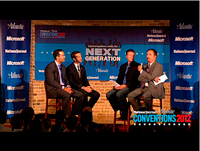 featured the children of some Republican politicians as well as up-and-coming legislators and other guests.What was surprising, however, was one of their approaches to improving educational outcomes: raising teacher salaries.
featured the children of some Republican politicians as well as up-and-coming legislators and other guests.What was surprising, however, was one of their approaches to improving educational outcomes: raising teacher salaries.
It was surprising to hear talk of such salary increases from a party that has become known for attacking teacher unions, most notably in Wisconsin under the tenure of Gov. Scott Walker, who has instituted measures to curb the collective bargaining powers of teachers. George P. Bush, son of former Florida Gov. Jeb Bush, was one of the first to bring up the issue, pointing out that teacher salaries had barely kept pace with inflation, and that teachers were due for a raise.
Beyond the unions, several speakers at the event pointed out that increasing teacher salaries was key if America is to have high-quality teachers in the future. They argued that there is no incentive for many talented young people to go into teaching when they have the option of far more lucrative careers in business and technology.
The subject of career choices brought up another interesting discussion topic: Are schools and colleges preparing young people to make informed career decisions?
For illustration, U.S. Rep. Aaron Schock, R-IL, who at 31 is the youngest member of Congress, relayed an anecdote from his middle-school years.When students at his school were asked what they wanted to be when they grew up, “They raise their hands and said, ‘I want to be an attorney.’ ‘Great, why?’ ‘Because I like watching ‘Law & Order,’” he said, prompting laughter in the capacity crowd.Schock continued, “And so what are we doing, in the 21st century, to get young people … more experiential learning? Because the more they have experience in that field, they more they are to be happy in it.”
But in general, the town hall speakers talked largely in generalities, arguing that the best ways to fix education were to cut bureaucracy and return most control to the states. Schock perhaps best summed up the conservative position on education reform: “We don’t actually believe you have to spend more money to get better results. We actually think that spending money better and more wisely, giving more flexibility to people at the local level and the states, will ensure greater accountability and better outcomes,” he explained.
Ann Romney
by Alaina Bradds, 17
On Aug. 28, the Tampa Bay Forum was packed as Ann Romney, wife of Mitt Romney, started to speak. This gracious woman captured the attention of the audience with her speech of love: love for one another, love for oneself and love for the United States of America.
Yet, she wasn't talking in the abstract. She talked about some of the trying times of her marriage, such as when she was diagnosed with and overcame cancer. She openly admitted that this was not an eas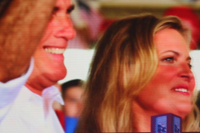 y time for her or her family, explaining, "We do not have a storybook marriage. What we have is a real marriage."
y time for her or her family, explaining, "We do not have a storybook marriage. What we have is a real marriage."
That marriage involved taking care of five children, managing the household, and helping her husband with the family business. It also involved instilling in her children a deep sense of love and trust so that once they grew up, they could go out into the world and thrive, she said.
As a young woman, I appreciated all Romney had to say about love and family. She seemed very much to represent hard-working women around America who strive to do the same for their children. Ann Romney touched on issues that concern young people as well—namely the economy and education.
She said that her husband would work to make sure that there would still be jobs available for young people after college and that they will not have to spend their life's savings in order to achieve a higher education. As an example of the education reform we could expect from Mitt Romney, she described the John and Abigail Adams scholarship that he started in Massachusetts, which provides four-year, tuition-free scholarships for students who graduate in the top 25 percent of their school district. She said that the program is something that Romney will work to implement on a national level. As a young person who is about to enter college, such a pledge made me take heart. I would dearly love to attain a college degree without having to go into debt.
Romney encouraged her audience and wanted them to believe in the future of America under the leadership of her family. Mitt Romney was able to achieve his dream and can now encourage others to do the same, she said: "This is the genius of America: dreams fulfilled help others launch new dreams."
These dreams are possible only in America, and we should give thanks for each other, she said. "You are the best of America. You are the hope of America. There would not be an America without you. Tonight, we salute you and sing your praises."
As she was wrapping up her speech, her husband joined her on stage. It was a heart-warming, not only because they were clearly so in love, but also because they have such faith in this country. In the end, Ann Romney showed that politics is not just a man's world. Her words of love and concern offered a calming antidote to the fiery oratory that is the usual hallmark of convention speakers.
Mitt Romney
by Naomi Farahan, 15
Presidential nominee Mitt Romney is often seen as stiff and formal. But his acceptance speech at the Republican National Convention won over his audience—with a few personal touches just sweet enough to generate a few sniffles and coos.
It was clear that the speakers leading up to Romney’s appearance were chosen to showcase his personal qualities. Fellow church-goers spoke of his dedication to spirituality and community. They depicted his faith in Morm onism as another commitment that he took on and excelled at. His friends talked about his fidelity and thanked him for visiting their families in times of duress. According to their stories, Romney has never failed to lend a helping hand.
onism as another commitment that he took on and excelled at. His friends talked about his fidelity and thanked him for visiting their families in times of duress. According to their stories, Romney has never failed to lend a helping hand.
Other figures in Romney’s life addressed his relationship to the country. His Massachusetts lieutenant governor, Kerry Healey, stressed Romney’s respect toward women in the workplace. She mentioned that during his term as governor, exactly half of the staff was female. Olympians spoke of Romney’s role in revamping the 2002 Winter Olympic Games, and of the honor he brought to the country after the 9/11 crisis.
Two speakers who reached out to the Latino community earned the biggest cheers. Craig Romney spoke about how his grandfather was born in Mexico, and he rallied support for his dad in what has been called perfect Spanish. U.S. Sen. Marco Rubio of Florida continued the thread, pointing out how the Romney story reflected one that many Americans share. “It’s the story of a man who was born into an uncertain future in a foreign country. His family came to America to escape revolution. They struggled through poverty ... Yet he rose to be an admired businessman and public servant.”
Then came Mitt Romney. He discussed some of the hot-button issues critical to this race: the economy, jobs, foreign policy, women in the work force. On the economy, he stated that nearly 1 in 6 Americans are in poverty. He laid out a five-step plan to create 12 million jobs. He stressed the need to have a more structured relationship with Russia. On the topic of women’s rights, the nominee quoted his mother. “Why should women have any less say than men on the great decisions facing our nation?” he asked.
Some of the people in the room felt Romney addressed the issues exactly as they had hoped. Lynn Rider of Redlands, Calif., said: “He really answered the questions we had in America—about the things he’s done, his business sense, and the great opportunities we have [here].” Rider explained that because she is a senior citizen and a cancer survivor, health care is a topic she was looking forward to hearing more about. She hopes that Paul Ryan’s plan will lead to a decrease in health-care costs and an increase in health-care options. “I think that [Romney and Ryan] addressed that issue, and it’s a real big one for senior citizens,” she said.
Others were unsatisfied with the speech. Delegate Kimberly Gurtler of Clarkesville, Ga., confided, “I was a little disappointed. It’s all just fluff. We need to hear exactly what he’s going to do – what the plan is. Instead, he’s making promises.”
Concern of low voter turnout among youth prompted questions to young people of their assessment of Romney’s address. Laddie Shane, a 21-year-old student from Arizona, was satisfied with the speech and said the candidate addressed the issues of most concern to him: job security, a balance budget, and better schools. “Romney’s speech was fantastic. Him bringing up so many issues that are going to affect us youth is so important.”
However, Shane said that restoring faith in the American dream is even more important than any speech. “We need to remember to reach for the stars again. That’s something we’ve lost in this country. We do what’s safe; we do what doesn’t tick people off.” It’s clear that Romney reached for the stars and won. His example certainly was enough to fire up the convention crowd. As we get closer to the race, the real question is related to our country’s journey to the stars – and whether or not voters feel that Romney can help us get there.
Tea Party Unity Rally
by Naomi Farahan, 15
Last Sunday, crowd members at the Unity Rally roared. And they were never given a reason to stop. On stage, the speakers offered a nonstop stream of funny quips, solutions to problems and jabs at liberals. Singers belted notes that left attendees on their feet, clapping with abandon. Former candidates Michele Bachmann and Herman Cain delivered messages that electrified—the U.S needs changing, and members of right-wing parties are going to be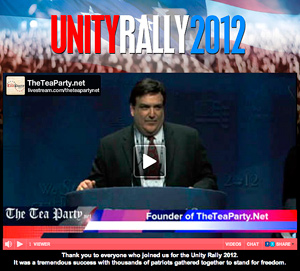 the ones to do it.
the ones to do it.
Pastor Rodney Howard-Browne opened the event at The River Church. The crowd was elated by his message of salvation. In unison, the crowd chanted, “I am saved. I am born again.” Ultimately, the crowd left feeling that the Republican Party is God’s party.
Songs of prayer played a large role in keeping the 2,000 attendees energized. Teleprompters provided the lyrics, and the crowd raised arms in unison. The political rally turned into a religious karaoke session.
Rust Humphries, a political commentator, hosted the event. He was unabashed by his views on the Democratic Party. Humphries advised the crowd to treat liberals like dogs. “Back!” he yelled. “No! I said no!” Audience members guffawed as he reprimanded an imaginary Democrat. He later spun a tale of Nancy “Palousy” on the plane “Broomstick One.”
By the time Congresswoman Bachmann arrived on stage, crowd members were easily excited. The smallest remark about Romney and the future of the GOP caused feet to stomp and fists to pump. Bachmann didn’t have to use strong language or emotions to rile the crowd —they were begging to be moved.
Former front-runner Herman Cain was the rally’s grand finale. His message—one of hope, frustration, and family history—was the true igniter. Audience members could relate to his parents’ struggle to procure a better life for Herman and his siblings. The former candidate got a few laughs by comparing family gatherings (where no one listens) to Democratic caucuses. The audience immediately warmed to Cain, the guy who understood them and their struggles. So when he talked about the importance of hard work, or “sweat equity,” attendees nodded as if they had been calling it that all along. When he spoke in favor of Mitt Romney and Paul Ryan, the crowd cheered in agreement.
It’s hard to tell if the Unity Rally ended up unifying. It was not a bipartisan event. Opposing sides never had to come together in agreement. But by the end of the night, people with the same political and religious beliefs convened, celebrated, discussed and parted. Perhaps they felt more unified as a party. All it took was music, a few jokes, a fervent sense of religion, and politicians who knew what to say.
Ron Paul Rally: Take 1
by Hannah Zimet, 18
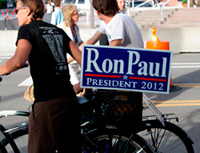 The crowd roars as we step into the stadium thousands of people wave posters like they are kites in the wind, not at all scared by the damp weather outside. Rep. Ron Paul, R-Texas, steps onstage like a rock star and the roar grows even louder.The vibe in the stadium in undeniably youthful. Bright, colorful lights frame the large screen that finds its home behind Paul's stoic figure.
The crowd roars as we step into the stadium thousands of people wave posters like they are kites in the wind, not at all scared by the damp weather outside. Rep. Ron Paul, R-Texas, steps onstage like a rock star and the roar grows even louder.The vibe in the stadium in undeniably youthful. Bright, colorful lights frame the large screen that finds its home behind Paul's stoic figure.
It's easy to see that Paul is not your typical politician and that his supporters could almost be more accurately described as fans. But who exactly is a Ron Paul fan?
Picturing a 77-year-old white male's followers often involves imagining a whole slew of the same. But the swarm of those who gathered to hear Paul speak are not nearly that homogeneous. Even a quick scan of the crowd reveals that a certain diversity is present. While skin shade does not seem to vary from person to person much, there are other very prominent differences.
A heavily bearded man in a camouflage cap stands tall next to a group of teenage, baby-faced boys. A woman screams wildly from the top of a chair and challenges being told to get down while a peaceful, fragile old lady peers over people's heads on her tippy toes.The juxtaposition between the young and the old cannot be missed. The only thing that seems to be consistent is the enthusiasm. It’s almost as if every single person in the crowd was wearing a Ron Paul T-shirt or grasping a crisp poster.
But it's not just those of voting age who are advertising their love for the Republican presidential candidate, there are kids as well. Youth wearing homemade shirts and dragging heavy card stock signs behind them are a normal sight. It's surprising, since one does not usually expect to see so many minors filling up seats and trotting along at a parent’s side without a complaint. Toddlers, grade school kids, pre-teens—they all seem to mesh into the crowd and appear to belong there.
Ron Paul Rally: Take 2
by Hrishi Deshpande, 17
Looking around the crowd at the Ron Paul Liberty rally on Sunday, it was clear the 77-year-old former candidate appeals to youth. His son thinks he knows why.
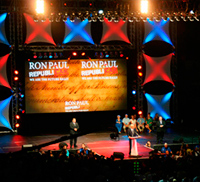 "Why do all these young people love Ron Paul? Why does the Internet love Ron Paul?" asked U.S. Sen. Rand Paul, R-Ky. "Well, you know, I'm his kid, I can tell you it's not because he's cool."
"Why do all these young people love Ron Paul? Why does the Internet love Ron Paul?" asked U.S. Sen. Rand Paul, R-Ky. "Well, you know, I'm his kid, I can tell you it's not because he's cool."
What is cool, according to Rand Paul, is his father’s stand on foreign policy, especially his commitment to ending foreign conflicts. "The ideas of liberty are cool," Paul asserted, galvanizing the the crowd of nearly10,000 assembled at the University of South Florida’s Sun Dome.
Indeed, U.S. Rep. Ron Paul, R-Texas, espouses a platform of non-interventionalism, opposing wars and supporting the return of U.S. forces stationed abroad. This is a refreshing change for many young people who are tired of U.S. involvement in Iraq and Afghanistan, says Evan Kenney, a delegate from Massachusetts.
Kenney may be only a college freshman, but he has already accomplished more than most activists. While still a senior at Wakefield High School, Kenney was elected as a GOP delegate from Massachusetts. There was only one problem: Kenney is a Ron Paul supporter. Despite affirming that he would abide by party rules and cast his vote for Mitt Romney at the convention, Kenney and 16 other Ron Paul-supporting elected delegates were removed by the party leadership and replaced with Romney supporters. Only last week was Kenney reinstated to his elected position. He is here in Tampa.
Kenney says one of the main issues that drew him to Paul was his stance on foreign policy. "There are no candidates that really excite the youth right now,” Kenney said. “I think these candidates need to start talking about bringing the troops home. I do think that energizes the youth."
Paul believes that Republicans will have to embrace elements of his father and the Liberty Movement's platform if they are to succeed in attracting the youth vote.
"This is something Republicans need to harken to and something Republicans need to understand," he argued. Kenney agrees. "Mitt Romney still has the capability to endorse the Liberty Movement,” Kenney said, “and that would be fantastic, but right now he’s not energizing the youth because he’s not connecting to them because he’s not talking about the things that excite them."
Ron Paul Rally: Take 3
by Sigal Tavel, 16
Despite having to concede the nomination to Mitt Romney, Ron Paul always seemed to be upbeat. His positive attitude may account for his continued popularity.
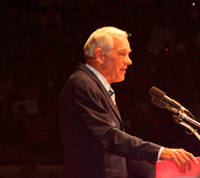 The three-day P.A.U.L. (People Awakening and United for Liberty) Fest, for example, injected a lot of fun into politics, with attractions such as a bounce house and musical performances, followed by political speeches. By the time the event wound down, supporters were sufficiently excited for the rally and the entrance of Ron Paul himself, who walked in to resounding cheers.
The three-day P.A.U.L. (People Awakening and United for Liberty) Fest, for example, injected a lot of fun into politics, with attractions such as a bounce house and musical performances, followed by political speeches. By the time the event wound down, supporters were sufficiently excited for the rally and the entrance of Ron Paul himself, who walked in to resounding cheers.
Perhaps Paul’s unique approach accounts in part for his relative success. He seems different from most politicians; he is straight-forward and approachable, with the aura of a kindly grandfather. Not only does the Ron Paul campaign make its own catchy music, it also boasts its own brand of chocolate because, according to the ronpaulbar.com, “every revolution requires chocolate … spread the sweet taste of Liberty to friends, family and co-workers.”
Although Paul will appear on video, not in person, at this convention, supporters believe the Liberty Movement has just started.
Whether it’s a musical production or his personal chocolate brand, Paul has certainly made an impressive effort to see that his beliefs are carried forward. Though his candidacy was unsuccessful, he did manage to win a significant amount of die-hard support.
Considering the amount of young people at the P.A.U.L. Fest, that support could prove vital come next election.
Newt Gingrich
by Greta Herbertz, 14
During the Republican National Convention, Newt Gingrich organized Newt U, four policy classes for delegates. Each session addressed a certain theme and took place at a different hotel in the Tampa area. 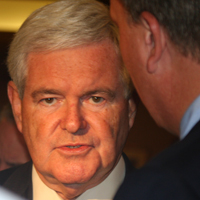
A few of us decided to go to the hotel that was hosting the session focusing on energy. We sat in for a bit, then positioned ourselves outside the door so that we could ask him some questions. After about an hour, he appeared and we were able to fire off one question, about the economy. Although Gingrich seemed rushed and slightly annoyed, he answered the question and walked away.
But we wanted to ask more, so after doing a little scouting, we found him and approached from behind. He seemed agitated—"Didn't you already ask me a question?"—but permitted us to ask another. We asked about re-energizing young Republicans who felt like they were being ignored. With a chuckle, he said that if youth want to be taken seriously, they should run for office.
Since early this year, Y-Press has interviewed youth across the country about their political involvement. Although none held an elected position, many are involved in the Republican Party in different ways—as convention delegates, as campaign volunteers, as leaders of political organizations and even as founders of political organizations. It seemed to us that though these youth aren't running for an office, they do deserve to be taken seriously.
Gingrich's answer shouldn’t have surprised us, though. After doing a little research, it appears that youth are no more fond of Gingrich than he is of them. According to The Center for Information and Research on Civic Learning and Engagement at Tufts University, Gingrich received just a small percentage of the youth vote in many states during the primary elections.
Herman Cain Q & A
by Naomi Farahan, 15, Alaina Bradds, 17, and Greta Herbertz, 14
Before the Republican Convention, tea party supporters held a unity rally. Former presidential candidate Herman Cain was one of the featured speakers. Two media outlets were selected to interview Cain—a Japanese national newspaper and Y-Press. Each team was allotted two questions.
The exchange took place before Cain’s speech at the River Church in Tampa.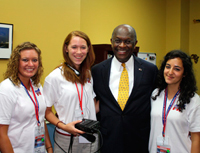
Q: According to researchers, since 2008, youth involvement has decreased. As a candidate, what have you done to connect with the youth of this generation?
A: First of all, I spoke at 15 colleges and universities last spring. We didn’t have a formal name for the tour, but I wanted to flesh out [whether there] are conservatives on these college campuses. And I went to some of the most perceived liberal colleges and universities in the country and conservative students came out of the woodwork. We had standing-room-only crowds in a lot of these places. Based upon that, this fall, we are doing what we call a “Truth Tour,” because too many young people don’t understand the truth about free enterprise.
Q: Talk about the importance of youth involvement in politics
A: Youth involvement in politics is critical because if they’re not involved, they’re part of the problem and not part of the solution. And this country is [what] the young people … inherit. Older people like me are not doing this for me. I’m doing it for the younger generation. So that’s why I think it’s critical that young people be involved to help determine the course that this nation takes because the future is going to be the future that you will have to live with.
Seventh graders talk about how politics affects their daily lives
by Naomi Farahan, 15, Greta Herbertz, 14, and Sigal Tavel, 16
With the Republican National Convention in session just a few miles away, four seventh-graders came together to discuss how politics affect their daily lives. Javon Cooper, Brianna Vigier, Samaya Oglesby and Lyric Vickers go to Academy Prep Center of Tampa, a middle school just north of Ybor City. Though they come from challenging backgrounds, their school stresses the importance of excellence and breaking the mold.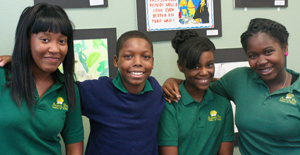
Like many 12-year-olds, these students aren't too concerned with politics. Though their teachers prepared them for the RNC festivities by reviewing historical figures, none of them wanted to be part of the proceedings. To Brianna, politics are "annoying.” "People try to put the other person down,” she said.
But the students understand why politics, and this convention in particular, are important. Many of these students' concerns coincide with the issues being discussed by the presidential candidates: education, job security, the economy. Other top concerns reflect their high-risk backgrounds: safety, gun control, drug abuse. “The worst thing right now is how people are killing people,” Lyric said.
In the middle ground between childhood and adulthood, these students are already starting to think about their roles in the community. Though they don’t have an interest in politics, they stay updated on the news, usually by television. Brianna mentioned that every Sunday, her family gets together to discuss current events.
While most American youth may focus on entertainment or sports news at the expense of world and domestic news, these students know that being informed is being empowered. The students' drive to stay informed is rooted in their school's mission statement: "To inspire and empower students qualifying for need-based scholarships to become future community leaders."
Once they are old enough, they will vote, they say. “At our age, we should start getting ready to vote,” explained Lyric. According to her, a person's vote proves that he or she is an active citizen. “A person who doesn’t vote, their opinion doesn’t count.”
But once they can vote, they intend to become involved in their community. For now, they know what is going on in their community and in the world. They know it’s important to stay informed so that when they are old enough, they can act appropriately.
To get a youth perspective on the 2012 Presidential Elections, WKCD has teamed up with the youth-led news bureau, Y-Press, based in Indianapolis. Originally part of the Children’s Express, Y-Press has nurtured young journalists for more than 20 years. Their stories and articles—on local, national, and global topics—appear every other week in the Indianapolis Star. The Y-Press web site is updated regularly and encourages external submissions and comments about youth-written stories and reviews.
Here, Y-Press reporters will be posting: stories about the campaign, the candidates, and youth perspectives on the political process profiles and interviews with young political activists results from surveys they’ve created to gather information from youth nationwide about the candidates and the issues most important to young people reports from the floor at both of this summer’s national conventions. Check back often to keep up with this special “youth beat” on Election 2012.
